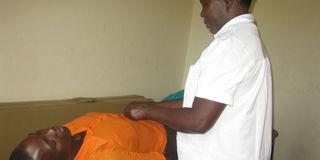Women opt for fake husbands to access antenatal services

A midwife at Abia Health Centre II attends to an expectant mother recently. Photo by Bill Oketch.
What you need to know:
Men shun accompanying their wives to hospitals for antenatal visits as they fear knowing their HIV status and physically confront their wives who insist on being accompanied.
Alebtong - Expectant mothers in Alebtong District have resorted to taking fake husbands in a bid to access antenatal services under the mandatory HIV/Aids counselling and testing progamme.
Women allege that their real husbands do not want to accompany them for antenatal services as they fear that may turn out HIV positive.
Early this year, the Health ministry announced that all people who seek treatment in public health centres across the country will undergo mandatory HIV testing to increase access to HIV prevention and treatment.
For expectant mothers seeking antenatal services, they are encouraged to come with their husbands for testing and counselling. However, men have reportedly resisted the plan.
Ms Alice Akullu, a mother of four, says her husband attacked her after she constantly pestered him to accompany her to the health centre.
Men shy away
“He feared testing for HIV/Aids because of the multiple partners that he has. He instead fought me,” Ms Akullu says.
She says on the fourth pregnancy, she had no option but to seek help from her brother-in-law who also demanded for a drink. Ms Akullu says she had to buy him a bottle of beer before he could accompany her to the health centre.
She says at the centre, those who come with their partners are given services faster and those without.
Ms Deborah Lanyero says she had to plead to a boda boda rider to be the ‘husband’.
“I gave him Shs1,500 so that I could access services easily at the centre,” Ms Lanyero says.
A midwife at Abia Health Centre II, Ms Constance Akullo, says the practice of men not accompanying their wives for antenatal care hinders the fight in elimination of mother-to-child transmission of HIV/Aids.
“The lives of both the mother and the baby are at a risky especially when the mother is HIV positive. In this case, the husband needs to be with the wife for support , especially on the next antenatal visits and drug adherence,” Ms Akullo says.
Dr Silvanus Okello Anam of Moroto Health IV condemns the men’s action. “They fear having an HIV test. But they don’t know the risk of failing to get tested. When you test together there is that support that you get from one other and the services given to the mother and baby help the family.”
The Alebtong assistant district health officer, Mr Anthony Ocen, says they are engaging the men through support groups so that they can learn the benefits of knowing their HIV status.
Mandatory HIV testing
In Uganda, mandatory testing was first piloted on expectant mothers attending antenatal care and general patients at regional referral hospitals in 2009.
Under the programme codenamed ‘provider-initiated testing’, HIV counselling and testing will be incorporated in the routine medical care, according to Dr Alex Ario, acting manager of the Aids Control Programme.
The system has been tested, with promising results, in selected districts since 2006.




